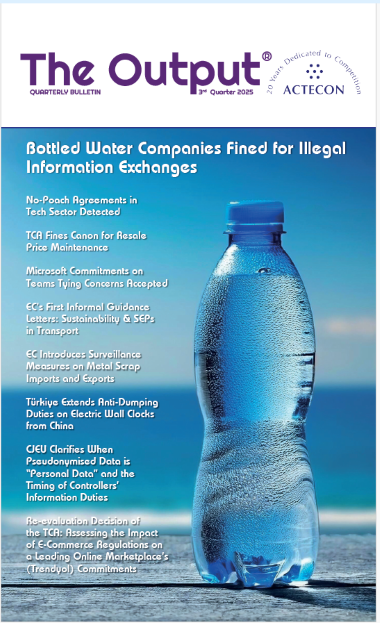A Significant Update Regarding the Producer/Exporter Certificate Regulation in Türkiye: Expanded Obligations and Verification Procedures under Trade Defence Measures
| International Trade

Article By Ertuğrul Can Canbolat and Zeynep Karakuş
The Producer/Exporter Certificate (“Certificate”) has long served as a critical instrument in Türkiye’s implementation of anti-dumping and countervailing duties, particularly in cases where such measures are applied on a company-specific basis. For importers to benefit from preferential, lower duty rates assigned to specific foreign producers or exporters, a valid Certificate must be presented at the time of customs declaration. Otherwise, imports are subject to the higher, residual duty rate applicable to all other exporters from the same country.
A recent and comprehensive update by the Turkish Ministry of Trade (“Ministry”) has introduced detailed rules governing the issuance, format, verification, and validity of the Certificate. These changes significantly increase the compliance obligations for all parties involved—importers, producer/exporters, and traders—by introducing stricter documentation requirements, formalizing verification procedures (including on-the-spot verifications), and limiting the Certificate’s validity to one year.
In that regard, this article outlines the details on the updated procedures and principles regarding the issuance, submission, and verification of the Certificate.
BACKGROUND INFO
On 27 March 2025, the Ministry has published an updated and detailed version of the regulation concerning the Producer/Exporter Certificate which has been implemented since 20021.
Under the regulation; when imports of the goods are subjected to anti-dumping or countervailing measures[2] on a company-specific basis, a Producer/Exporter Certificate must be issued for the importers to benefit from the lower company-specific duty rates determined for the relevant producer/exporter. Without the Certificate, the importers will have to pay the higher general duty rate assigned to all other companies from the subject country.
In that regard, the new and updated regulation[3] primarily establishes details regarding the (i) issuance and format, (ii) responsibilities and the potential verification practices to which producer/exporters, traders and importers may be subjected, and (iii) validity period of the documents. Moreover, it is stated that in case the company-specific duty rate is higher than the general duty rate for all other companies from the subject country, the customs authorities will strictly require the Certificate for each company, including the companies subject to the general rate for all other companies, and apply the specific rate assigned to each.
ISSUANCE AND FORMAT (ARTICLE 5)
Compared to the previous regulation, the new regulation requires relatively more detailed documentation and information. However, the Communiqué No. 2025/1 does not require information regarding “description of which fundamental stages of the production of the goods are carried out by the producer issuing the certificate” which was required under the Communiqué No. 2002/1.
In that regard, the Certificate must be issued electronically and in English by the producer/exporter or trader who issues the original invoice. It must be fully completed, bear wet-ink signature by an authorized representative, and be accompanied by the invoice forming the basis of the customs declaration for the relevant imports.
The Certificate must be submitted to the customs authorities at the time of the customs declaration for release into free circulation. Submissions made after the release of the goods for free circulation will not be accepted by the customs authorities. The invoice number and date shall be recorded by the importer in box 44 of the customs declaration.
RESPONSIBILITY AND VERIFICATION (ARTICLE 6)
Importers, producers/exporters, and traders (if applicable) are individually responsible for the accuracy of the submitted documents. The burden of proof lies with the importer. If the importer fails to prove the accuracy of the Certificate, the relevant imports shall not benefit from the lower company-specific duty rate determined for the relevant producer/exporter. In such case, the highest measure will be applied for the importer. If a tax evasion for the administration occurs during this process, the provisions of the Customs Law and other relevant customs legislation regarding the actions and irregularities that result in tax evasion will apply.
Additionally, the producer/exporter and traders are required to retain a copy of the Certificate along with sufficient supporting documentation for a period of three years from the date of registration of the customs declaration. Previous regulation did not specify such requirement.
The Ministry may request additional supporting documents from producer/exporter, trader or importer in order to verify the Certificate. Also, as detailed via the new regulation, the Ministry may also (i) conduct on-the-spot verifications, (ii) request the relevant customs authorities of the subject countries to conduct on-the-spot verifications, and (iii) request information from the relevant customs authorities of the subject countries. These verifications can be done during or after the importation.
During the inspections, the delivery of the goods may be requested in writing without waiting for the conclusion of the procedures. In such cases, the goods may be released without waiting for the completion of the procedures, provided that a guarantee in the amount equivalent to the highest rate of measure is provided.
VALIDITY PERIOD (ARTICLE 7)
Previous regulation did not specify any validity period for the Certificate. In contrast, it is stated in the new regulation that the Certificate is valid for one year from the date of issuance. Additionally, for goods placed in a free zone or warehouse, the validity period may be suspended during the time the goods remain in the free zone or warehouse, provided that the Certificate is timely submitted to the customs authorities. The remaining validity period will resume from the date the goods exit the free zone or warehouse.
CONCLUSION
It is evident that obligations and responsibilities of importers wishing to import products from companies subject to customer-specific duty rates under trade defence measures have been detailed and expanded.
Additionally, it is important to note that responsibilities have also been distinctly increased for producer/exporters and traders (where applicable) who are subject to customer-specific duty rates under trade defence measures. Specifically, the new regulation now mandates the provision of more detailed information for the Certificate, which must now be issued annually due to its one-year validity period. Moreover, companies are required to retain the Certificate, along with other relevant documentation, for a minimum of three years. Lastly, there remains a potential for the Ministry to request further information or conduct on-the-spot verifications involving producer/exporters, traders and importers.






